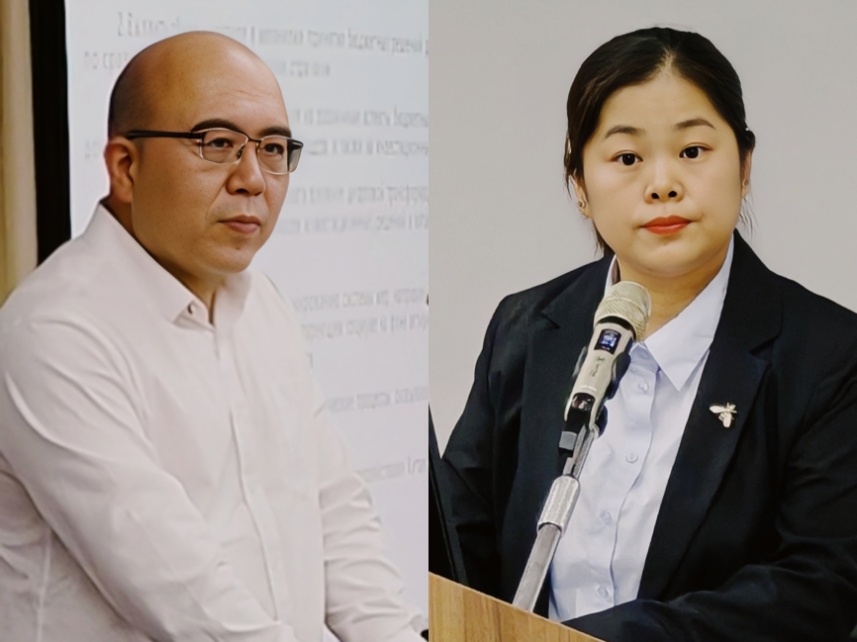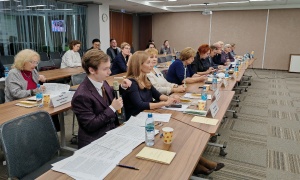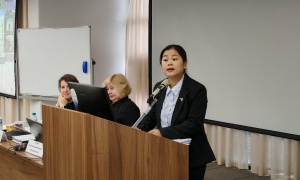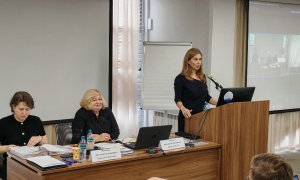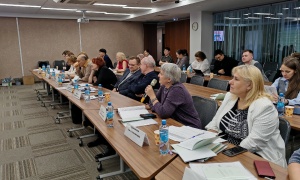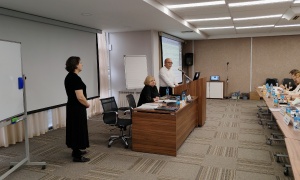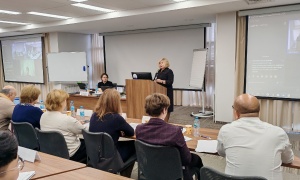
"Young Seniors" and the Modern Family Budget in the Digital Age: IEM Hosts Double Dissertation Defense by PhD Graduates from China
The Institute of Economics and Management (IEM) recently held a unique dissertation defense, with two Chinese nationals who completed their PhD studies at IEM ŌĆö Zhang Xiaoxia and Yuan Kefeng ŌĆö presenting their research on the same day.
The topics of both dissertations in the field of "Regional and Sectoral Economics" are linked to major trends in China: population aging and rapid digitalization. As noted by the chair of the dissertation committee and Director of IEM, Evgenia Nekhoda, both works highlight the country-specific aspects of these issues,as well as their relevance for other nations and their economies. The scientific supervisor for both PhD students was Dr. Olga Nedospasova, Head of the Department of Organizational Behavior and Human Resource Management at IEM TSU.
Zhang Xiaoxia's dissertation, titled "Labor Activity of 'Young Seniors' in China in the Context of Digitalization", focuses on the adaptation of pre-retirement and retirement-age individuals to modern labor market conditions. To identify factors influencing the labor activity of "young seniors" in China, the PhD student conducted a survey of over 1,300 respondents. The research confirmed that this age group is not ready to retire and wishes to continue working. The reasons are not only economic but also social: people aged 55ŌĆō70 speak about the importance of self-realization at this stage of life. Key barriers they face include imperfect government policies, age discrimination, and low digital identity.
ŌĆö The problem of population aging is extremely relevant for China, as it places significant pressure on the social security and healthcare systems. The phenomenon of 'young seniors,' who possess the potential to participate in economic activity, deserves special attention. Their knowledge and experience can become a valuable source of labor. From a social perspective, engaging this segment of the population in work also contributes to their self-realization, ŌĆö Zhang Xiaoxia noted in her presentation.
Zhang Xiaoxia drew attention to one of the main problems on this path ŌĆö digital identity. "Young seniors" are much less adapted to digital realities than younger generations. They lack sufficiently developed digital knowledge and skills necessary to overcome "digital divides", which hinders their ability to interact effectively with the digital environment. According to Zhang Xiaoxia, targeted government policies are needed to involve the older generation in digitalization: this would help "young seniors" remain in demand among employers. This, in turn, would create conditions for mitigating the macro- and microeconomic problems of an aging society.
Yuan Kefeng, in his work "Transformation of the Budget Decision-Making Mechanism in the Modern Chinese Family", examined how the combination of a high level of economic development and a low level of financial literacy among a growing number of elderly people influences decision-making in Chinese families.
ŌĆö The share of people over 65 in China has exceeded 14%, which significantly increases the burden on family budgets. But how exactly does it influence, and is it possible to change this influence? This was precisely the goal of my work ŌĆö to study these patterns and propose a solution. For comparison: in many developed countries ŌĆö Germany, the USA, the UK, Japan ŌĆö investment decisions within families are supported by the synergy of three factors: the reliability of financial institutions, product diversification, and public financial literacy. I hope I have managed to find one of the tools that can ensure financial health both at the family and state levels, ŌĆö says Yuan Kefeng.
The author of the dissertation developed a multi-level model of how budget decisions are made in a Chinese family. The model integrates both macro-factors (demographics and digitalization) and micro-factors (income and family traditions). The value of the model lies in its ability to help understand how family spending changes due to global problems and general life changes.
Based on the model, practical recommendations were proposed for asset allocation within individual families to assess financial health and develop long-term strategies, taking into account income, demographic burden, and digital literacy. This "household asset allocation matrix" will help not only the households themselves but also the state and financial structures to identify key risks and develop budget strategies tailored to specific income levels and family life cycles.
ŌĆö Zhang Xiaoxia and Yuan Kefeng took on a very ambitious task ŌĆö to link and analyze two giant global trends simultaneously: demographic aging and digitalization. The PhD students managed to show how the synergy of these two trends is transforming processes within Chinese families. They were not intimidated by a large array of empirical data: hundreds of respondents and over a thousand Chinese households were surveyed. Every variable, every hypothesis was discussed long and meticulously. One of the key discoveries is the dual role of digitalization: on one hand, it naturally drives income forward, but on the other hand, it exacerbates inequality in modern society. The bold, innovative contribution to science made by Zhang Xiaoxia and Yuan Kefeng significantly changes our view of what the older generation represents in the context of the modern economy, ŌĆö says the students' scientific supervisor, Olga Nedospasova.
